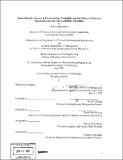| dc.contributor.advisor | Roy E. Welsch and David Simchi-Levi. | en_US |
| dc.contributor.author | Peavey, Milo Camp | en_US |
| dc.contributor.other | Sloan School of Management. | en_US |
| dc.date.accessioned | 2007-10-22T17:30:56Z | |
| dc.date.available | 2007-10-22T17:30:56Z | |
| dc.date.copyright | 2007 | en_US |
| dc.date.issued | 2007 | en_US |
| dc.identifier.uri | http://hdl.handle.net/1721.1/39287 | |
| dc.description | Thesis (S.M.)--Massachusetts Institute of Technology, Dept. of Civil and Environmental Engineering; and, (M.B.A.)--Massachusetts Institute of Technology, Sloan School of Management; in conjunction with the Leaders for Manufacturing Program at MIT, 2007. | en_US |
| dc.description | Includes bibliographical references (p. 46). | en_US |
| dc.description.abstract | This thesis quantifies the sensitivity of tool availability variability with respect to product throughput and examines how Intel's High Precision Maintenance initiative can be used to minimize these effects. Tools with variable availability release spikes of material into a route which can cause down stream areas to experience irregular queues. The reentrant multi product loops typical to Intel's manufacturing processes can make it difficult to identify the source of long queues. The variability analysis, developed during the internship uses D2 facility availability and cycle time data to generate a variability correlation, called TAC-TOOT which identifies tools within the facility contributing to throughput time. The High Precision Maintenance initiative is an Intel developed program which focuses on the standardization of maintenance processes. The success of the High Precision Maintenance initiative is closely linked to the ability of factory management to motivate equipment technicians. The thesis examines a number of tools with highly variable availability, the effects of the high precision initiative on variability and levers factory management can use to motivate technicians. | en_US |
| dc.description.statementofresponsibility | by Milo Camp Peavey. | en_US |
| dc.format.extent | 57 p. | en_US |
| dc.language.iso | eng | en_US |
| dc.publisher | Massachusetts Institute of Technology | en_US |
| dc.rights | M.I.T. theses are protected by copyright. They may be viewed from this source for any purpose, but reproduction or distribution in any format is prohibited without written permission. See provided URL for inquiries about permission. | en_US |
| dc.rights.uri | http://dspace.mit.edu/handle/1721.1/7582 | |
| dc.subject | Civil and Environmental Engineering. | en_US |
| dc.subject | Sloan School of Management. | en_US |
| dc.title | Quantifying the source of reentrant line variability and the effects of processes standardization on tool availability variability | en_US |
| dc.type | Thesis | en_US |
| dc.description.degree | M.B.A. | en_US |
| dc.description.degree | S.M. | en_US |
| dc.contributor.department | Massachusetts Institute of Technology. Department of Civil and Environmental Engineering | |
| dc.contributor.department | Sloan School of Management | |
| dc.identifier.oclc | 172716359 | en_US |
